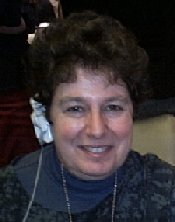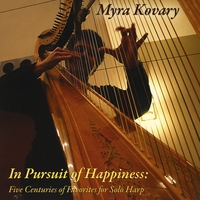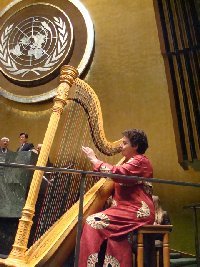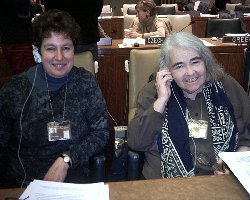| MYRA KOVARY HARPIST, HUMAN RIGHTS ACTIVIST, ADVOCATE AGAINST FORCED PSYCHIATRY, MARTIAL ARTIST, LATE COMER TO FEMINISM  I was born in Columbus, Ohio in 1952
and grew up in Ithaca, NY in a very modest home with my parents and younger sister. I was born in Columbus, Ohio in 1952
and grew up in Ithaca, NY in a very modest home with my parents and younger sister. My mother was born in Germany in 1921. She and her brother and sister were sent on a Kindertransport to England just before World War II and thus survived the Nazis. Their parents were later deported to Minsk where they were killed. My father was born in Czechoslovakia in 1920. He and his brother were wrestlers and were the first students of Imi Lichtenfeld, a martial artist who later went to Israel and founded Krav Maga, the self-defense system that is used by the Israeli Defense Forces. (I didn’t find out about their connection to Krav Maga until after I got my black belt in Tae Kwon Do in 2010.) In 1939, the brothers were attacked by two Nazis. With assistance from their father, they beat the Nazis almost to death and all three men were thrown into jail. A few weeks later, the head of the prison let them out in the middle of the night. They met up with my grandmother and fled to the countryside, later to Hungary, and to the US in 1940. If this hadn't happened, they probably would have been killed in concentration camps, as were many members of our family. My father and his brother served in the US Army during the war and my mother served in the Civilian Censorship Division of the US Army in Germany after the war. She also immigrated to the US. My parents met in Ohio and got married in 1950. They managed to live remarkably stable lives. My mother never got a high school diploma, but she taught German at Cornell University until she retired. My father attended college on the GI bill, attended graduate school at Cornell, and taught Spanish and linguistics at the State University of NY at Cortland. Knowing what they experienced made me very aware how important it is to stand up against injustice. In the 1960’s, Ithaca was a hotbed of radical politics. A bit precocious teen ager and very bored in school, I participated with the Cornell Students for a Democratic Society in protests against the Vietnam War and against Cornell’s housing policies that caused rents to be unaffordable for the local people. I graduated from high school in 1969 and went to the Woodstock Music Festival that summer. I entered Cornell University in the fall. In 1970 I marched in Washington against the Vietnam War. The feminist movement was just starting, and I resisted it mightily. A housemate, who had attended a speech by Kate Millett at Cornell, decided she wasn’t going to wear a bra, shave her legs or wash the dishes anymore. Well, we lived with two guys – so who ended up doing the dishes? Me!!! Without knowing anything about it, I decided women’s liberation was a bunch of crap. So much for being precocious! But at least I had heard of Kate Millett. My mother was really a feminist. In 1970, she told me, “Kate Millett is the brains behind the women’s liberation movement.” I dropped out of Cornell and decided I wanted to play the harp. After a few lessons with Alice Chalifoux, the distinguished principal harpist of the Cleveland Orchestra, I asked her opinion of my chances of making it as a harpist. Her reply was, “Myra, get your ass to Cleveland and I’ll make you a harpist.” So off I went.
Shortly thereafter, while practicing the harp, I pulled a muscle in my hand and Valium was prescribed as a muscle relaxant. I had a very bad reaction to it and ended up in a psychiatric institution, where I was force-medicated with heavy neuroleptics and was threatened with electroshock “treatment.” I managed to get out only when my parents decided the hospital staff was crazier than I and had me transferred to Upstate Medical Center in Syracuse, NY (where Thomas Szasz, a radical psychiatrist who had written a book entitled “The Myth of Mental Illness,” was on the faculty). After being there for a week, I was discharged. I began freelancing as an orchestral harpist in the Ithaca area and have been doing it ever since. But music didn’t keep the freedom-fighter part of me engaged. Still hanging on to dreams of making the world a better place, I realized that without money, we hippie types would never be able to actualize our dreams. My favorite bumper sticker was “It’ll be a great day when the Defense Department has to hold a bake sale to buy a B-1 bomber.” In 1979, tired of having to hold fundraisers and relying on donations to support all the progressive work being done in Ithaca, a few activist friends looked into starting a bank, but found a credit union was an easier way to go. I was a founding Board Member of the Alternatives Federal Credit Union (AFCU) and served on the board from 1979 - 1986. The goals of the AFCU were to support cooperative businesses, make loans available to women and self-employed people, promote organic agriculture, alternative energy, and energy-efficient vehicles. The AFCU has grown to well over a $50 million operation and serves as a model for other community development credit unions around the country. I got married in 1982, had two children, and left my husband in 1986. I was involuntarily institutionalized in psychiatric facilities shortly after I left and again several years later during what was a long and ugly custody battle. The battle finally ended after nine years, when my ex-husband succeeded in using my psychiatric history to gain control of our two children. I didn’t see them again until they were young adults. It was a very traumatic experience for all of us. Reading Phyllis Chesler’s “Mothers on Trial” was a life-saver during that time. My relationships with my children continue to be difficult to this day. I still personally struggle to stay on this side of the locked doors. It has put an enormous strain on my sense of self, on all the significant relationships in my life, on my ability to earn a living, and on my sense of connection with society in general. It also inspires my advocacy against forced psychiatry. The way I survived my experience of forced psychiatry was by connecting with people who shared similar experiences. In 1980, I co-founded the Mental Patients Alliance in Ithaca, NY – a support and advocacy group opposed to forced psychiatry. I initiated what has become a world-wide day of demonstrations against psychiatric oppression and a celebration of MadPride on Bastille Day. From 1980 to 2001, I served on the Board of Directors of the Mental Health Association in Tompkins County in Ithaca as president, vice-president and chair of various committees. I launched several programs including a Hospital Advocacy Program and a Crisis Hostel Project that provided short-term housing and peer support to avoid psychiatric hospitalization. The Crisis Hostel Project was written up in the New York Times. I represented MindFreedom International at the United Nations during the negotiations on the Convention on the Rights of Persons with Disabilities from 2002 - 2006. I worked with Kate Millett, Celia Brown, and a team from the World Network of Users and Survivors of Psychiatry led by Tina Minkowitz. When the text of the Convention was adopted in 2006 and included full recognition of all human rights for people with disabilities, including users and survivors of psychiatry, I proudly declared “The revolution has begun!”  I continue to work as a professional free-lance classical harpist and harp teacher. I perform for recitals, weddings and receptions as a soloist and in a flute and harp duo. I recorded two CDs, one of flute and harp music entitled “Morning Light” and a solo harp CD entitled "In Pursuit of Happiness." I commissioned Ithaca composer Laurie Conrad to write two new chamber music works, “Visions” for flute and harp and “Images” for flute, violin, viola and harp, both of which she dedicated to me. I performed the world premieres and recorded CDs of both pieces. I played my harp for the Dalai Lama when he visited Ithaca in 1991 and I played in the General Assembly Hall at the United Nations celebration of the Entry Into Force of the Convention on the Rights of Persons with Disabilities in 2008. More information on my CDs and harp career is available at www.myrakovary.com.
I am a member of the Ithaca Lesbian Gay Bisexual Transgender Task Force, the Board of Directors of the Finger Lakes Independence Center, the Board of Directors of the Alternatives Venture Fund (a non-profit affiliated with the Alternatives Federal Credit Union), a member of the National Women’s Martial Arts Federation, and I’m proud to be a member of the Veteran Feminists of America. My latest attempt to incorporate feminism into my work as a human rights activist is as the moderator of the listserv for the International Network of Women with Disabilities (INWWD), which we launched in 2008 when it became clear that women with disabilities needed to be more visible on the international scene. I got involved with INWWD because users and survivors of psychiatry are under-represented in the disability rights movement and women are particularly oppressed by the patriarchal structure of psychiatry. Women’s voices need amplification in the movement advocating for the human rights of users and survivors of psychiatry as well. Connecting with other women with disabilities has been an excellent opportunity to advance a feminist perspective that I hope will tear at the roots of psychiatric oppression. Contact Myra: mmk29@cornell.edu Visit Myra's Website: www.myrakovary.com Visit the Center for the Human Rights of Users and Survivors of Psychiatry http://www.chrusp.org Visit International Network of Women with Disabilities (INWWD) http://inwwd.wordpress.com READ the NY Times Article: The Crisis Hostel Project Comments: Jacqui Ceballos, Veteran Feminists of America: jcvfa@aol.com Back to Front Page |

